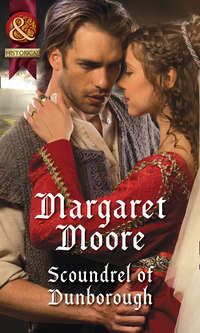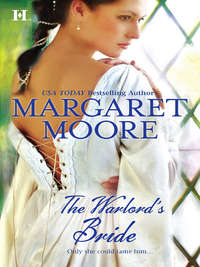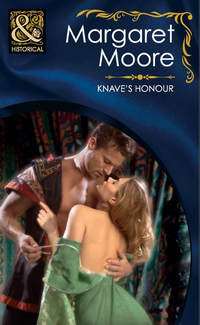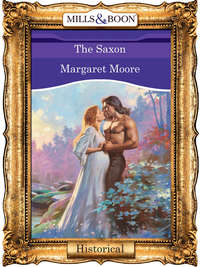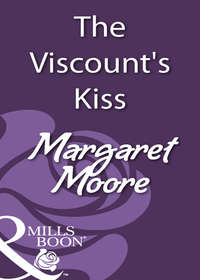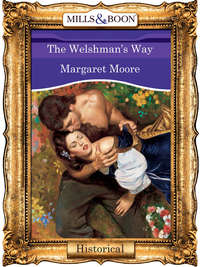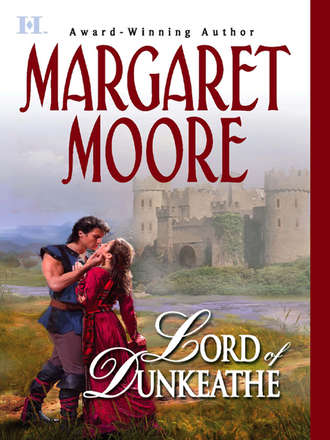
Полная версия
Lord of Dunkeathe
Riona instantly recognized the young man who’d been wearing yellow damask. Lady Eleanor was the pretty girl who’d seemed so unhappy. She didn’t look any happier standing beside her cousin in the hall, attired in a gown of deep red cendal trimmed with gold, like the circlet on her dark brown hair. Sir Percival had changed into a tunic of peacock blue, trimmed with brilliant green, and he had a large gold chain around his neck. His boots alone—leather dyed scarlet and embossed with gold and silver—would likely pay for her uncle’s wine for a year.
All the nobles were similarly dressed in sumptuous, colorful and expensive garments, embroidered with lovely threads of bright colors. The quality and number of materials was mind-boggling, and as for the cost, Riona could probably feed their entire household for half a year on what it cost for a single gown one of these ladies wore, not to mention the gold and silver and costly gems they wore on their fingers or around their necks.
“If you’ll excuse me, Riona, I’ll go say hello to Fredella. She was very helpful to me when I was looking for the fellow in charge of the quarters.”
Uncle Fergus didn’t wait for Riona to agree, but bustled off toward the older woman. Since she couldn’t call him back without attracting more unwelcome attention, Riona moved to the side of the hall and surveyed the gathered nobles.
Across the chamber, Lord Chesleigh, in a long black tunic, held forth about the rising cost of wine to a small group of noblemen. One of his listeners had a very bulbous red nose and he swayed so much that Riona suspected he’d been into the wine already. A younger man, not so brilliantly attired, hovered on the edge of another group as if he were too shy to join it, yet didn’t want to leave. A lady in that small gathering kept glancing at him as if she wasn’t sure if he should go or stay, either.
“What can Sir Nicholas be thinking, letting that fat little Scot stay?” a haughty and unfortunately familiar female voice drawled nearby, so loud and imperious, Riona couldn’t ignore it. “I wouldn’t believe it, except that his steward told me it’s true.”
Lady Joscelind, in gold brocade, with her blond hair covered in a shimmering veil, stood with a small circle of young women several feet closer to the dais, her back to Riona. The one who giggled was among them, and another who looked rather sickly. A third wasn’t exactly slender. The last wasn’t particular attractive, but she seemed less impressed with the beautiful Lady Joscelind than the others.
“If that’s a Scots noble, we’d be doing their peasants a favor ruling their country,” Lord Chesleigh’s daughter continued, raising her slender hand in a languid, yet graceful, gesture before she let it drop. “And who’d want to stay here anyway? The people are such savages, and the weather! My father tells me it rains nineteen days out of twenty.”
It was bad enough the vain creature had disparaged Uncle Fergus. Now she was disparaging Riona’s country, too?
Glaring at the beauty, Riona marched toward the little circle.
“But if Sir Nicholas chooses you, you’ll have to live in Scotland,” the sickly looking young woman simpered, likewise not seeing Riona bear down upon them.
The other women did, and if Lady Joscelind had been less determined to express her opinions, she might have realized something was amiss.
“Only a part of the year,” she smugly and obliviously replied. “We’ll be spending a great deal of time at court.”
“England is welcome to you,” Riona snapped as she came to a halt behind her. “We don’t want you here.”
“Of all the impudence!” Lady Joscelind exclaimed, whirling around in a blaze of silk and thick perfume to meet Riona’s glare with one of her own. “How dare you interrupt our conversation?” She waved her away. “Be about your business, wench, and be glad I don’t have you punished for your insolence.”
“Oh, aye?” Riona replied, raising her brow as she crossed her arms, ignoring the other women who exchanged shocked or wary glances. “You think you wield such power over me?”
“If I don’t, somebody here must, impudent wench.”
“I answer to no one here, except Fergus Mac Gordon Mac Darbudh, Thane of Glencleith.”
Lady Joscelind smirked. “So you belong to that comical fellow, do you? Well, go tend to him, then.”
“My lady, do you not know who I am?” Riona asked, her voice low and firm and full of contempt.
Lady Joscelind’s smooth white brow furrowed with annoyance. “I neither know, nor care.”
“You should.”
Lady Joscelind’s cheeks turned pink, but her haughty demeanor didn’t alter. “Whoever you are, you hussy, I am Lady Joscelind, the daughter of Lord Chesleigh, and you had best remember that.”
“I am Lady Riona of Glencleith.”
“Lady Riona?” the beauty scoffed, running a scornful gaze over Riona’s garments. “I don’t believe it. You’re nothing but a servant.”
“Whether you believe it or not,” Riona replied, “Sir Nicholas and his steward know that it’s true.”
Lady Joscelind’s eyes narrowed with suspicion, yet when she spoke, she was still scornful and dismissive. “If you are who you claim to be, I assume you’ve come here to meet Sir Nicholas. You think you stand a chance of impressing him?”
“As it happens, my lady, I’ve already met him. And so have you, although you didn’t know it.” Riona smiled without mirth. “I don’t think you made a very favorable impression.”
Lady Joscelind’s jaw dropped, then indignantly snapped shut. “I should think I’d remember being introduced to Sir Nicholas.”
“I didn’t say you’d been introduced. I said you’d met him.”
Riona spotted Uncle Fergus coming toward her with Fredella in tow. “Now if you’ll excuse me, I should join my uncle, whose family have been thanes and chieftains here since before the Normans existed.”
She started to leave, then turned back. “Oh, and I’ll remind you that Sir Nicholas holds this land by the grace of Alexander of Scotland, not Henry of England, so if there’s a court he and his wife should attend, it’s that of Scotland. That’s provided he even picks you, of course,” she finished with another smile that suggested she found that highly doubtful.
Then, she swept away from the Norman ladies, leaving Lady Joscelind to wonder how and where she’d met the lord of Dunkeathe.
Riona wished they hadn’t come here. She wished Uncle Fergus had never heard of Sir Nicholas’s plans to find himself a wife. Most of all, she wished the king had never invited the Normans to Scotland at all, or paid mercenaries to serve him, even if rebellion and rival claims to the throne were part and parcel of the history of her land.
When she reached Uncle Fergus, who seemed completely unaware that anything untoward had happened, he pulled Fredella forward. “Riona, my beauty, this is Fredella.”
Fredella’s smile was nearly as jovial as Uncle Fergus’s. “I’m delighted to meet you, my lady, and I’m sure Eleanor will be, too,” she said. “My mistress is a shy girl, but she’ll want to be introduced to you.”
“We’d be delighted to meet her, too, wouldn’t we, Riona?” Uncle Fergus answered for her.
Remembering the smiles she’d exchanged with the younger woman, Riona had hope Lady Eleanor wouldn’t prove to be another Lady Joscelind. “Aye, I’d be happy to meet her.”
“Not now, though,” Fredella whispered with a worried frown as she drew them both away to the side of the hall.
“Why wait? She’s here and so are we,” Uncle Fergus said, not bothering to lower his voice.
“Because Sir Percival’s with her. He, um, doesn’t think much of the Scots, I’m afraid,” Fredella replied, her plump cheeks coloring.
Uncle Fergus glowered at Sir Percival. “Doesn’t like Scots, eh? Because we don’t fuss with our hair and spend more on a tunic than many a poor family earns in a year?”
“Neither Eleanor nor I share his prejudice,” Fredella hastily assured him. “My own mother was a Scot, you see.”
Uncle Fergus stopped glaring at the Norman and gave her a smile. “Was she now?”
“Yes, from Lochbarr.”
“A fine place, that,” Uncle Fergus said, his anger lessening. “And the Mac Tarans are a fine clan.” He gave Riona a significant look. “That’s the clan Sir Nicholas’s sister married into.”
“Oh, you’ve heard of them, have you?” Fredella asked.
“I don’t think there are many Scots who haven’t,” Uncle Fergus replied. “A fine group of fighters always come out of Lochbarr.”
“Eleanor’s often longed to go there, to see the things I’ve talked about,” Fredella said, “but that Percival wouldn’t let her. She’s hardly been able to see anyone, either. To keep her pure, he says, as if she had no virtue or modesty to speak of. She’s been raised better than that, I can tell you, by me and her dear sainted mother.”
“She’s an orphan?” Riona asked.
“Since she was ten. That’s when that Percival got the charge of her. If you ask me, he’s got more love for those ridiculous boots of his than he does for his cousin. He’s just waiting for somebody rich to offer to take her off his hands. He makes me want to spit!”
“Poor bairn,” Uncle Fergus murmured.
Riona shared his sympathy. She could imagine how her life might have been had her kindly uncle not taken her in. Yet in a way, she also envied Lady Eleanor, who had at least known her mother. Riona had no memory of hers, who had died in childbirth, or her father, who had died of a fever a short time later.
A sudden stir near the steps leading from the hall to the apartments made Riona turn. The mighty lord of Dunkeathe strode toward the dais. Now he was finely dressed in a black, thigh-length tunic and breeches and polished boots. His hair was still the same, though—long and waving to his shoulders, like her countrymen—and he still had the same angular handsome features, and those eyes that seemed more hawk than human. Yet in those clothes, with the attention of everyone in the hall upon him, he looked more like a prince than a soldier. How could she ever have assumed he was anything but a noble lord? The only common thing about him was the sword hilt sticking out of the scabbard attached to his belt. It was exceptionally plain, just a bronze crossbar wrapped with leather, as any foot soldier might possess.
She looked to Lord Chesleigh and his daughter, to see if they recognized him. The Norman nobleman was staring at Sir Nicholas as if he was seeing an apparition; his daughter’s face was bright red, and although she lowered her head, Riona saw enough to know that she was flushed not from shame, but with indignant anger.
That didn’t bode well for a match between the lady and the lord of Dunkeathe, unless Lord Chesleigh and his daughter thought him worthy enough to overlook what had happened in the courtyard.
Sir Nicholas came to a halt in the center of the raised platform, in front of the high table. “My lords and ladies, knights and gentlemen, welcome to Dunkeathe. I am both flattered and delighted to see so many of you here.” He made what was, she assumed, supposed to be a smile. “I especially welcome the young ladies, although there are so many of such beauty, grace and accomplishments, I am overwhelmed.”
Riona didn’t believe that for a moment.
Sir Nicholas turned to his steward, who was standing at the left side of the dais, a wax tablet in his hands. “If you would begin, Robert.”
The man consulted what was obviously a list. “My lord, may I present the Duke of Ansley and his sister, Lady Elizabeth.”
A man of middle years, with a sizable belly and attired in a long blue robe, hurried forward, leading a lady likewise plump, wearing a gown in an unflattering shade of burgundy. Sir Nicholas bowed, as did the nobleman, while the lady made her obeisance.
There were no smiles exchanged, and the lady was clearly nervous.
The steward proceeded to introduce all the ladies and their relatives one by one. The woman who’d been less impressed with Lady Joscelind was Lady Lavinia, the second cousin of the Duc D’Anglevoix, who had the longest, most arched nose Riona had ever seen. He also seemed a bit put out, darting annoyed glances at the steward and the man who’d just been introduced. Clearly D’Anglevoix felt he should have been called first.
The round-eyed Lady Priscilla, who came next, giggled the entire time she stood before Sir Nicholas, and the young man beside her looked as if he’d gladly gag her as he led her away. The Earl of Eglinburg, who likewise hadn’t missed many meals, strode forward so quickly, his daughter, Lady Mary, had to run to keep up with him, for she was short while he was tall.
Sir George, he of the bulbous red nose and swaying gait, slurred a greeting and nearly fell over when he bowed. His daughter, Lady Eloise, who was neither pretty nor plain, looked understandably and completely mortified, while Sir Nicholas’s expression didn’t change a bit.
Lady Isabelle blushed bright red when she was introduced, no doubt not just because of the inscrutable visage of their host, but also because her guardian, Sir James, tripped on her silk gown as he led her forward. Next to be called, the Comte D’Ortelieu looked as if he considered this whole exercise rather beneath him, while his daughter, Lady Catherine, turned as white as her gown and seemed about to swoon at any moment.
None of them, it seemed, recognized Sir Nicholas from the courtyard.
Then Robert Martleby summoned Lord Chesleigh and his beautiful daughter. His expression haughty, Lord Chesleigh strode forth, escorting Lady Joscelind. For a moment, Riona thought he might chastise his host. Instead, the man bowed and said in a hearty voice that was only slightly condemning, “My lord, this is a very great pleasure, but you should have declared yourself in the courtyard.”
That caused a bit of a flutter among the other guests.
“He was in the courtyard?” Uncle Fergus loudly whispered. “Where? I didn’t see him.”
Maybe her uncle hadn’t met Sir Nicholas after all. “By the stable. He wasn’t dressed like that.”
Uncle Fergus chuckled. “Clever man, to watch the ladies before they knew who he was, to see how they really are.”
Riona’s gaze darted back to the man on the dais. Was that why he’d done that?
“I should have enlightened you, but I was not properly attired to receive my noble guests,” Sir Nicholas replied, “and I couldn’t refuse the request of so graceful and beautiful a lady.”
Riona was somewhat amazed Lady Joscelind didn’t clutch her father’s arm to steady herself when the lord of Dunkeathe addressed her in that deep, seductive voice.
As for Sir Nicholas’s excuse, Riona could more easily believe Uncle Fergus’s explanation. She suspected there were very few things that could embarrass a man like Sir Nicholas, and she was sure his clothing wouldn’t be one of them.
Any offense clearly forgiven, Lord Chesleigh smiled with genial bonhomie. “Nonetheless, my lord, you must accept my apologies for any inadvertent offense.”
Sir Nicholas’s next words, spoken with no real contrition, convinced Riona there was indeed another motive for his behavior. “As you must accept mine for not introducing myself.”
Lord Chesleigh fairly beamed as he reached for his daughter’s hand and drew her forward. “May I present my daughter, Joscelind.”
She made a deep obeisance and when she rose, presented a charmingly flustered countenance. “I also beg your pardon, my lord.”
“Think no more about it, I beg you, and please, consider Dunkeathe your home while you’re here.”
If ever a man could make a woman swoon with his voice alone…
“And a very fine fortress it is,” Lord Chesleigh said. “I commend you, my lord.”
Sir Nicholas gave him another very small smile, and a brief bow. “Thank you.” Then he glanced at his steward.
Lord Chesleigh and Lady Joscelind took the hint and moved away.
After a quick look around the hall to see if there were any other ladies waiting to be introduced, Uncle Fergus started forward. “Come on, Riona, our turn next.”
She had no desire to parade in front of all these people and be presented to a Norman lord like a fish on a platter. Unfortunately, Uncle Fergus was already hurrying forward, so unless she wanted him to call out for her to hurry up, she had no choice but to follow. As she did, she reminded herself that if she had no wealth, fine clothes or beauty, she still had much to be proud of. Her uncle and cousin loved her, she was as noble as anyone here and she had one considerable advantage they lacked.
She was a Scot.
“Fergus Mac Gordon, Thane of Glencleith,” the steward announced. “And his niece, the Lady Riona.”
“Ach, we’ve already met!” Uncle Fergus cried, grinning at the lord of Dunkeathe as if they were boon companions.
They had met! When? Where? Why hadn’t he told her?
As her uncle looked at her and gave her a wink, she had her answer. He thought he’d been helping and kept this for a surprise.
In spite of his kindhearted motive, she wanted to groan with dismay, especially when Sir Nicholas’s expression didn’t alter, and snickers and disapproving murmurs reached her ears.
“As if anybody would want to marry her,” Lord Chesleigh said behind her.
His scornful words lit her pride and roused her anger. Who was this Lord Chesleigh to speak so arrogantly? These men and their mute relatives were all here like beggars at this man’s whim.
She would show them what Scots were made of, and that they were the equal of any here, including their host. She didn’t care what any of them thought of her, even Sir Nicholas, with his grim face and arrogant method of finding a wife.
So she gave Sir Nicholas a bright smile and said, in Gaelic and in a voice loud enough to carry to the far reaches of the hall, “Good evening, my lord. Don’t you look different in your fine clothes. I might never have recognized you, except for the hair.”
Surprise flared in Sir Nicholas’s dark eyes and there were more incredulous whispers behind her. They were all surely wondering what she was saying.
Let them wonder.
“My uncle didn’t tell me you’d met, but I should have expected it. He’s a very friendly fellow.”
“Yes, he is,” the nobleman replied, clearly recovered from his surprise—and in unexpectedly good Gaelic.
That took her aback, but she tried not to show it. He was the one who was supposed to be thrown off guard. “I didn’t realize you spoke our language so well, my lord,” she lied, for she hadn’t expected him to speak it at all. “I’m most impressed.”
“I suspect there’s a great deal about me you don’t know.”
God help her, that voice of his was like temptation incarnate, and his gaze was so steady, she felt as if he was staring into her very soul, looking for the truth.
But she wasn’t about to let him intimidate her here anymore than she had in the courtyard when she thought he was just a soldier. “I daresay you’re right. I can only guess why you were skulking about the courtyard this morning instead of greeting your arriving guests.”
His eyes narrowed very slightly. “I wasn’t skulking.”
“Whatever you were doing, I’m sure you had your reasons,” she replied, telling him with her tone and eyes that she didn’t believe his reasons would be sufficient for her.
His steward coughed.
She knew an attempt to interrupt when she heard it, and she’d said enough to show them all that she was proud of her heritage and the country that bred her. “Come, Uncle,” she said, slipping her arm through his. “Let’s leave Sir Nicholas to his other noble guests.”
As they walked away through the crowd of muttering Normans, Uncle Fergus laughed softly. “He fooled everyone except my clever girl. You showed him some Scots spirit, too. He’s got to be impressed.”
Riona didn’t care if Sir Nicholas was impressed or not, or what he thought about her. She couldn’t imagine living in this place among the Normans and their Saxon soldiers, and certainly not with him.
CHAPTER FOUR
AS THE SERVANTS carried away the remains of the baked apples, Nicholas turned to Robert, seated to his left at the high table. To his right was the elderly priest who had taken residence in the castle after the chapel had been completed. Father Damon greatly appreciated the ease of his duties ministering to Sir Nicholas, as well as the household and garrison. The lord of Dunkeathe was certainly no stickler on religious matters.
Robert stopped looking at the table where the beautiful Lady Joscelind and several of the other guests were sitting. Nicholas couldn’t blame the man for being distracted; so might he have been, if he hadn’t encountered Lady Joscelind in the courtyard.
“I’m going to give the garrison commander the watchword for tonight,” he said, rising. “If my guests require more wine or food, or music, it should be provided.”
“As you wish, my lord. And the watchword is…?”
Nicholas gave his steward a small smile. “Restraint.”
Robert’s eyes widened, then he flushed. “Forgive my lack of attention, my lord. I’m not used to being among so many nobles and several of the young ladies—”
“Are quite attractive,” Nicholas replied evenly. “I might be worried your eyesight was going if you weren’t distracted. I should return shortly.”
He begged Father Damon to excuse him, and then left the dais. In truth, he was happy to get away from his guests for a little while. He, too, wasn’t used to being around so many nobles who weren’t also trained fighters waiting for a battle or a tournament. These high-ranking men were the same sort who’d treated him with scornful disdain before he’d earned his castle, with the possible exception of young Audric, who seemed a quiet, modest fellow.
As Nicholas made his way through the tables and the cloying odor of perfume, he nodded greetings to his guests. Whatever he thought of them personally, they were all powerful and important in their way, and he wouldn’t offend them if he could help it. He’d come perilously close with Lord Chesleigh. He should have had the good sense to stay by the stable wall and not let himself be intrigued by a bright-eyed woman sitting on a ramshackle cart.
The boisterous Scots thane was seated toward the back of the hall, in a place that should have told the man, if he had any perception at all, that his niece was unlikely to be the object of Nicholas’s favor.
Where was she?
Perhaps she was tired from her journey, or from upbraiding him in front of his guests.
He should be angry about that. He’d certainly been angry when she’d first spoken, but he’d found it difficult to stay angry when she faced him with that vivid, defiant fire in her eyes and spoke to him not with coyness or even deference, but as if she were his equal in pride, if nothing else. He’d noted the regal carriage of her head that would befit a queen, and that she looked more noble in her simple gown than any of the ladies in their fine clothes and costly jewels.
It was a pity her family was poor and unimportant, for she would likely prove worth the wooing.
Once outside, he drew in deep breaths of the fresh air slightly tainted by the smell of smoke from the Midsummer bonfires. The courtyard was too far from the village for noise to reach him from the celebrations, yet he didn’t doubt there was much merrymaking and many games being played, with far more good humor and joy than that shared by those feasting in his hall. His guests, though, weren’t friends or well known to each other, so what else could he expect?
He passed by the kitchen and glanced over the fence into the garden. It was a fairly large one, and normally provided enough for the needs of his household. An apple tree, now finished blooming, stood in the center like a guardian, as he was guardian of the people on his estate, watching over them as he’d watched over his brother and sister.
Someone was beneath the apple tree—a woman, seated on what looked like an overturned bucket.
It was the Lady Riona, gazing up at the sky through the leafy branches as if seeking heavenly portents. Or perhaps she was unwell.


